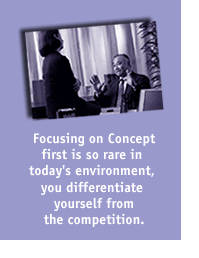|
|
|
by
Stephen E. Heiman, Diane Sanchez with Tad Tuleja
The
Concept is the potential buyer's expectation of what you and/or your product
will be able to do for him or her. Another way of saying it is to point
out that customers, like everyone in business, are always looking for
results. Only if they think you can provide them with the results they
need, will they want to hear about your product.
 There
are many advantages to understanding what the Customer Concept is. When
we follow up on the salespeople who have been through our Conceptual Selling
program, we ask them to tell us what benefits they have noticed in their
own businesses from starting each face-to-face encounter at the Customer's
Concept. Here's what they tell us: There
are many advantages to understanding what the Customer Concept is. When
we follow up on the salespeople who have been through our Conceptual Selling
program, we ask them to tell us what benefits they have noticed in their
own businesses from starting each face-to-face encounter at the Customer's
Concept. Here's what they tell us:
- Focusing on the Concept first allows you to learn more about
your customer than you could possibly learn if you started off by
pitching a product. Even the most product-oriented seller will acknowledge
that the more you know about your individual customers, the better
your chances of keeping them for the long term. Starting with the
Concept is preeminently a "close to the customer" approach.
- By drawing out the customer current interest and concerns, you can
focus on results that she really wants to get accomplished—not
just the results you think your product can or should deliver. This
in turn makes it possible for you to highlight the specific objectives
you can address and to tailor your presentations accordingly.
- Because focusing on Concept first is so rare in today's environment,
you differentiate yourself from the competition. The novelty
of the "question first" style gives the questioning salesperson a
unique advantage over all those competitors who concentrate mostly
on telling.
- Starting at the Concept minimizes the importance of price competition.
It lets the customer know that you are interested in delivering value—value
that he specifically needs—and it therefore puts you several steps
ahead of those competitors who are merely playing low-bid games.
- In the majority of corporate sales, although several or many Yes's
are necessary for the sale to go through, there is always one person's
Yes that counts as final approval. Focusing on Concept first is an
ideal way to position yourself with the person who makes the final
decision.
- Finally, focusing on Concept first enable you to spot early in the
selling cycles, those customers or situations where you cannot come
out Win-Win. Let's face it—not everybody in the business world wants
to play Win-Win. Some people are constitutionally unable or unwilling
to let you win—they thrive on making others lose. By focusing on Concept
first, you not only scope out good opportunities but you also identify
early in the selling cycle, sales you should not pursue.
Many
novice salespeople are still being taught that you should go for every
piece of business every time and that there's no such thing as a bad sale.
If you've been selling for any length of time, you know that's not true.
Every sales professional has written business that turned out to cost
him more than it was worth.
Adapted
from The New Conceptual Selling
Stephen E. Heiman, Diane Sanchez with Tad Tuleja (c) 1999 by Miller Heiman,
Inc., All rights reserved with permission of Warner Books. Inc.
|
|

 There
are many advantages to understanding what the Customer Concept is. When
we follow up on the salespeople who have been through our Conceptual Selling
program, we ask them to tell us what benefits they have noticed in their
own businesses from starting each face-to-face encounter at the Customer's
Concept. Here's what they tell us:
There
are many advantages to understanding what the Customer Concept is. When
we follow up on the salespeople who have been through our Conceptual Selling
program, we ask them to tell us what benefits they have noticed in their
own businesses from starting each face-to-face encounter at the Customer's
Concept. Here's what they tell us: